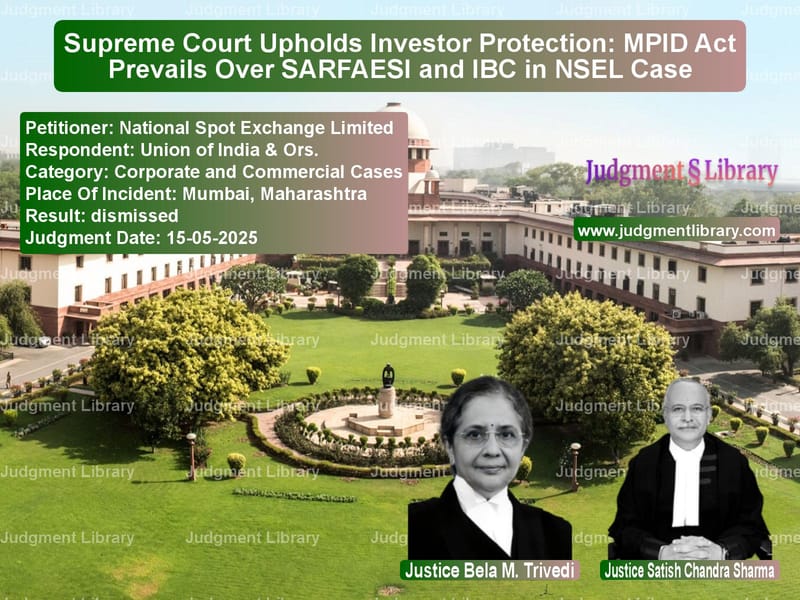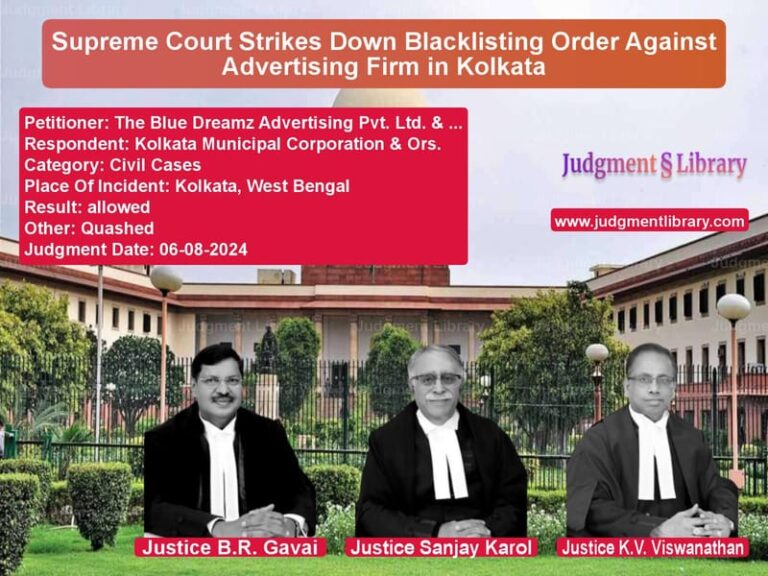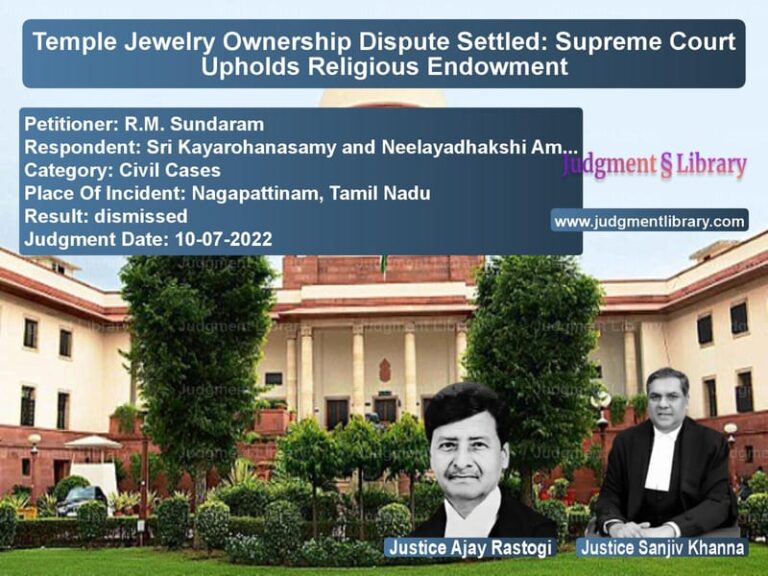Supreme Court Upholds Investor Protection: MPID Act Prevails Over SARFAESI and IBC in NSEL Case
In a landmark judgment that clarifies the complex interplay between various financial and investor protection laws, the Supreme Court of India has delivered a significant verdict in the long-standing National Spot Exchange Limited (NSEL) case. The judgment, delivered on May 15, 2025, addresses crucial questions about which law takes precedence when multiple statutes appear to conflict – particularly when it comes to protecting the interests of defrauded investors. The case involved approximately 13,000 traders who lost around Rs. 5,600 crores in the NSEL payment default scam that came to light in 2013.
The NSEL provided an electronic platform for trading commodities between buyers and sellers through registered members. The trouble began when the Department of Consumer Affairs directed NSEL to stop launching new contracts in July 2013. Subsequently, NSEL suspended its exchange operations, leading to massive payment defaults by 24 trading members. What followed was a complex web of legal proceedings involving multiple laws and competing claims from various stakeholders.
The Core Legal Questions
The Supreme Court was faced with two fundamental questions that would determine how the remaining assets would be distributed among various claimants. The first question was whether secured creditors would have priority over assets attached under the Prevention of Money Laundering Act (PMLA) and Maharashtra Protection of Investors and Depositors Act (MPID Act) by virtue of provisions in the SARFAESI Act and Recovery of Debts and Bankruptcy (RDB) Act. The second question was whether properties attached under the MPID Act would be available for execution of decrees against judgment debtors despite the moratorium provisions under Section 14 of the Insolvency and Bankruptcy Code (IBC).
The secured creditors, primarily financial institutions that had lent money to the defaulting NSEL members, argued that their claims should take priority. They contended that “the provisions of SARFAESI Act and RDB Act would override any claim for priority of interest by the Secured creditors in respect of the property which has been attached under the MPID Act.” They maintained that as secured creditors, they had superior rights over the attached properties.
The Constitutional Framework
The Supreme Court began its analysis by examining the constitutional framework governing legislative powers in India. The Court emphasized the federal structure of the Constitution, noting that “the Principle of Federal supremacy viz. that in case of inevitable conflict between Union and State powers, the Union power as enumerated in List-I shall prevail over the State power as enumerated in Lists-II and III, and in case of overlapping between Lists II and III, the latter shall prevail.”
The Court applied the “pith and substance” doctrine to determine the true nature and purpose of each legislation. It found that “the MPID Act has been validly enacted by the Government of Maharashtra for the matters falling in List-II- State List, and therefore it would prevail in the State of Maharashtra.” The Court noted that the MPID Act was primarily concerned with protecting depositors from fraudulent financial establishments, falling under Entries 1, 30 and 32 of the State List.
In contrast, the SARFAESI Act and RDB Act were found to relate to “Banking” under Entry 45 of the Union List, while the IBC dealt with “Bankruptcy and Insolvency” under Entry 9 of the Concurrent List. The PMLA was traceable to Entry 13 of the Union List concerning United Nations participation.
The Court’s Reasoning on Legislative Competence
The Court made several crucial observations about the balance of power between central and state legislation. It emphasized that “merely because the SARFAESI Act and RDB Act which are enacted in respect of the subject matter falling in List-I and having been enacted by Parliament, they could not be permitted to override the MPID Act, which is validly enacted for the subject matter falling in List-II – State List.”
The judgment further stated that “if such an interpretation is permitted to be made, it would amount to denuding the State of its legislative power to enact and enforce legislation, which is within the exclusive domain of the State, and it would offend the very principle of Federal Structure set out in Article 246 of the Constitution of India, held to be a part of the basic structure of Constitution of India.”
The Court referenced the Constitution Bench decision in ITC Limited vs. Agricultural Produce Market Committee, where it was observed that “While maintaining parliamentary supremacy, one cannot give a go-by to the federalism which has been held to be a basic feature of the Constitution.”
Analysis of Specific Provisions
The Court examined Section 26E of the SARFAESI Act, which gives secured creditors priority over all other debts and government dues. However, it found that this provision did not apply to the situation at hand. The Court reasoned that “such monies or deposits of depositors/ investors, who have been allegedly defrauded by the Financial Establishment, and for the recovery of which the MPID Act has been enacted, could not be said to be a ‘debt’ contemplated in Section 26E of the SARFAESI Act.”
Regarding the MPID Act’s provisions, the Court noted that under Section 4(2), “all the properties and assets of the Financial Establishment and the persons mentioned therein shall forthwith vest in the Competent Authority appointed by the Government, pending further orders from the Designated Court.” This vesting of properties in the Competent Authority meant they were no longer available for other claimants.
The IBC Moratorium Question
On the second question concerning the IBC moratorium, the Court found no inconsistency between the MPID Act and IBC. It observed that “the proceedings under the IBC arise out of the Debtor-Creditor relationships of the parties” while “the attachment of properties under Section 4 of the MPID Act is concerned, it is beyond the realm of the Debtor-Creditor relationship as contemplated in the IBC.”
The Court explained that “on the publication of the Order of Attachment of Properties by the Government to protect the interest of the Depositors of the Financial Establishment, such properties and assets of the Financial Establishment and the persons mentioned in sub-section (1) of Section 4, would forthwith vest in the Competent Authority appointed by the Government.”
The Final Ruling
After extensive analysis, the Supreme Court answered both questions definitively. On the first question about secured creditors’ priority, the Court held that “no priority of interest can be claimed by the Secured Creditors against the properties attached under the MPID Act and that the provisions of MPID Act would override any claim for priority of interest by the Secured Creditors in respect of the properties which have been attached under the MPID Act.”
On the second question concerning the IBC moratorium, the Court ruled that “the properties of the Judgment Debtors and Garnishees attached under the provisions of the MPID Act, would be available for the execution of the decrees against the Judgment Debtors by the S.C. Committee, despite the provision of Moratorium under Section 14 of the IBC.”
Broader Implications
This judgment has significant implications for investor protection in India. It reinforces the primacy of state legislation specifically designed to protect depositors from fraudulent financial establishments. The Court’s strong emphasis on federalism and the distinct legislative domains of central and state governments sets an important precedent for future cases involving overlapping legislation.
The ruling ensures that the interests of approximately 13,000 defrauded investors in the NSEL case will be protected ahead of secured creditors. It validates the mechanism established by the Supreme Court through its 2022 order, which created a special committee to oversee the recovery and distribution of assets to investors.
The judgment also clarifies the hierarchy of laws in similar financial fraud cases, providing much-needed certainty for investors, financial institutions, and regulators. By upholding the MPID Act’s provisions, the Supreme Court has sent a clear message that laws specifically designed to protect small investors from financial fraud will be given due weightage, even when they appear to conflict with other financial legislation.
This case represents a significant victory for investor rights and state legislative power, balancing the complex interplay between various central and state laws while ensuring that the primary purpose of investor protection legislation is not diluted by other statutory claims.
Petitioner Name: National Spot Exchange Limited.Respondent Name: Union of India & Ors..Judgment By: Justice Bela M. Trivedi, Justice Satish Chandra Sharma.Place Of Incident: Mumbai, Maharashtra.Judgment Date: 15-05-2025.Result: dismissed.
Don’t miss out on the full details! Download the complete judgment in PDF format below and gain valuable insights instantly!
Download Judgment: national-spot-exchan-vs-union-of-india-&-ors-supreme-court-of-india-judgment-dated-15-05-2025.pdf
Directly Download Judgment: Directly download this Judgment
See all petitions in Company Law
See all petitions in Bankruptcy and Insolvency
See all petitions in Corporate Governance
See all petitions in unfair trade practices
See all petitions in Fraud and Forgery
See all petitions in Judgment by Bela M. Trivedi
See all petitions in Judgment by Satish Chandra Sharma
See all petitions in dismissed
See all petitions in supreme court of India judgments May 2025
See all petitions in 2025 judgments
See all posts in Corporate and Commercial Cases Category
See all allowed petitions in Corporate and Commercial Cases Category
See all Dismissed petitions in Corporate and Commercial Cases Category
See all partially allowed petitions in Corporate and Commercial Cases Category







